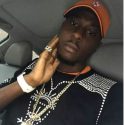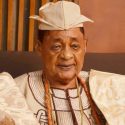“If You Want To Stay Alive, Avoid People Who Believe COVID Does Not Exist” – COVID-19 Survivor Shares Ordeal
“I was not bothered about myself. It was my family — my three young children and my wife — that I was worried about. My wife has an underlying illness and I didn’t know what I was going to do if she caught the virus,” said Johnson Kayode Kolade, a 42-year-old father living at Ifako-Ijaiye in Lagos, as he recollected the harrowing two weeks of his life which had him battling the COVID-19 virus.
Johnson Kayode Kolade, Health Administrator and HR Professional, living in Lagos, survived COVID in 2020.
Kayode is a Health Administrator and HR Professional at a popular hospital in Lagos. In March 2020, a young woman was admitted into the hospital after complaining of “simple” flu-like symptoms. She did not reveal that she had just returned from the UK, and could have been exposed to the COVID-19 virus. Kayode and the rest of the medical staff on duty carried on with their day jobs as usual. If only they knew.
When the woman’s state of health quickly deteriorated despite all medical interventions, she revealed the information that set the hospital on high-alert mode. State health authorities were informed and the hospital’s doctors and nurses were quarantined. Unfortunately, one of the nurses on duty had been infected and soon the virus spread.
Soon after, Kayode and two other colleagues noticed that their throats were sore, but they dismissed this as mild irritations. A day later, Kayode had severe headaches and admitted to feeling extremely fatigued. By the third day, he was exhibiting symptoms that hinted at malaria: high fever and body ache. He promptly attempted to treat it, and he started getting stronger. But the recovery was short-lived. The excruciating pain all over his body intensified, and his itchy throat had metamorphosed into a serious cough.
One morning, when he realised that he could barely move his body, he figured he could have been infected with the virus. His first instinct – “protect my family” – forced him to isolate himself on the balcony of his apartment.
Within that first week, he lost a lot of weight, could barely eat and was hit with a strong wave of nausea. In spite of the gruelling changes his body went through in such a short period, watching his children through the balcony of his house was the most painful part of the experience.
“They would press their faces to the bars of the balcony and call my name. They couldn’t understand why they could see their father, but were not allowed to come to me or touch me. It was confusing for them. It was painful to watch.”
Thankfully, the experience is over for the family.
“When I fell ill, there were no tests. So, I had to take care of myself. I got a positive result 16 days afterwards, and by that time I had already isolated myself and was treating it.”
Kayode was tested six times between April and July, and the results returned positive every time, until the very last test. It took him about a month to get back to his former self.
When he was asked about his treatment process, Kayode said he used everything. He did not take any chances; once he suspected he had the virus, he purchased the treatment that was in popular use at the time in Nigeria, hydroxychloroquine, which cost N3,500. By the next day, when the family tried to purchase the same medicine, the price had skyrocketed to N18,000 per pack! In the end, it cost nearly N200,000 to treat the family.
“People should accept the reality that COVID exists. If we can only pay attention to some basic hygiene procedures, COVID can be handled. Wash your hands properly, cover your nose with a face mask and when you get home, bathe and clean up before touching anything or anyone in the house,” Kayode warned.
He believes that avoiding crowded environments can help. “And most importantly, do not stay around people who do not believe that COVID exists, because they will expose you to more danger,” he warns with a grim look.
Thankfully, Project SafeUp — an initiative developed by My World of Bags, in partnership with Mastercard Foundation — has been producing and distributing PPE and safety items to the general public and health workers in Oyo, Lagos, Osun, Ondo and Ekiti, since November 2020.
The project is going a step further to enlighten the public on the importance of staying cautious by highlighting the true stories of Nigerian COVID-survivors; the impact on their families and communities; and the aftermath of surviving a pandemic that has killed over 2.5 million people across the world.
You can visit www.myworldofbags.com or call 0708 928 7992 or e-mail safeupng@gmail.com for more information about this project.
Are you a COVID survivor, or do you know of any survivors? Join the conversation on #ProjectSafeUp on Twitter and Instagram.







